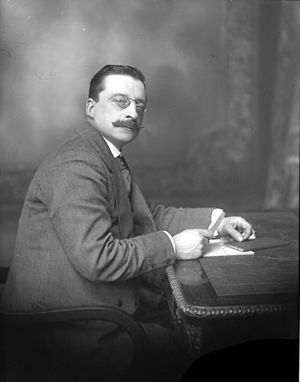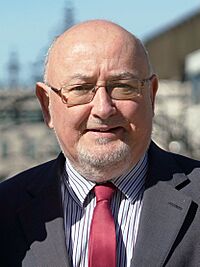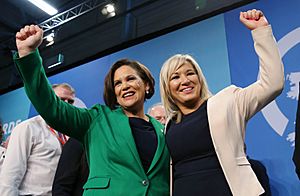Sinn Féin facts for kids
Quick facts for kids <div style="padding-top:0.3em; padding-bottom:0.3em; border-top:2px solid Lua error in Module:European_and_national_party_data/config at line 227: attempt to index field 'data' (a nil value).; border-bottom:2px solid Lua error in Module:European_and_national_party_data/config at line 227: attempt to index field 'data' (a nil value).; line-height: 1;">
Sinn Féin
|
|
|---|---|
 |
|
| President | Mary Lou McDonald |
| Vice president | Michelle O'Neill |
| Chairperson | Declan Kearney |
| General Secretary | Ken O'Connell |
| Seanad leader | Conor Murphy |
| Founder | Arthur Griffith |
| Founded |
|
| Merger of | National Council Cumann na nGaedheal Dungannon Clubs |
| Headquarters | 44 Parnell Square, Dublin, Ireland |
| Newspaper | An Phoblacht |
| Youth wing | Ógra Shinn Féin |
| LGBT wing | Sinn Féin LGBTQIA+ |
| Overseas wing | Friends of Sinn Féin |
| Membership (2020) | |
| Ideology |
|
| Political position | Centre-left to left-wing |
| European Parliament group | The Left |
| Colours | Green |
| Slogan | Tosaíonn athrú anseo ('Change starts here') |
| Dáil Éireann | Lua error in Module:European_and_national_party_data/config at line 227: attempt to index field 'data' (a nil value). |
| Seanad Éireann | Lua error in Module:European_and_national_party_data/config at line 227: attempt to index field 'data' (a nil value). |
| European Parliament | Lua error in Module:European_and_national_party_data/config at line 227: attempt to index field 'data' (a nil value). |
| Northern Ireland Assembly |
27 / 90
|
| House of Commons (NI seats) |
7 / 18
(abstentionist) |
| Councillors in the Republic of Ireland |
99 / 949
|
| Councils led in the Republic of Ireland |
2 / 27
|
| Local government in Northern Ireland |
144 / 462
|
| Councils led in Northern Ireland |
6 / 11
|
| Website | |
| Lua error in Module:European_and_national_party_data/config at line 227: attempt to index field 'data' (a nil value). | |
Sinn Féin (pronounced shin fayn) is an Irish republican political party that is active in both the Republic of Ireland and Northern Ireland. The name means "We Ourselves" in the Irish. The party believes in democratic socialism and left-wing nationalism.
The first Sinn Féin was founded in 1905 by Arthur Griffith. Its members were involved in the Irish War of Independence. The party later split, leading to the creation of Ireland's two main traditional parties, Fianna Fáil and Fine Gael. For many years, the remaining Sinn Féin was a small party.
A major split in 1970, at the start of a period of conflict known as the Troubles, created the modern Sinn Féin party. During this time, the party was associated with the Provisional Irish Republican Army. After Gerry Adams became leader in 1983, the party focused more on winning elections. In the 1990s, Sinn Féin played a key role in the Northern Ireland peace process, which led to the Good Friday Agreement. This agreement created the Northern Ireland Assembly, where different parties share power.
Today, Sinn Féin is the largest party in the Northern Ireland Assembly. In 2024, Michelle O'Neill became the first Irish nationalist First Minister of Northern Ireland. In the Republic of Ireland, Sinn Féin is the main opposition party in the Dáil Éireann (the Irish parliament). The party's current president is Mary Lou McDonald.
Contents
What Does the Name "Sinn Féin" Mean?
The phrase "Sinn Féin" is Irish for "Ourselves" or "We Ourselves." It is sometimes incorrectly translated as "ourselves alone." The name represents the idea of Irish national sovereignty. This means the Irish people should govern themselves, instead of being part of the United Kingdom.
In 1970, the party split into two groups. One was called "Official Sinn Féin," which later became the Workers' Party. The other was called "Provisional Sinn Féin." Today, the "Provisional" part is no longer used, and the party is simply known as Sinn Féin.
History of the Party
Early Years (1905–1922)
Sinn Féin was founded on November 28, 1905. At first, Arthur Griffith wanted Ireland to have its own parliament but remain connected to the British monarch, similar to how Austria and Hungary were set up at the time.
The party's popularity grew after the Easter Rising of 1916. Even though Griffith didn't take part, many people started calling it the "Sinn Féin Rising." By 1917, the party's goal had changed to creating an independent Irish Republic.
In the 1918 general election, Sinn Féin won 73 of Ireland's 105 seats. Its elected members refused to go to the British Parliament in London. Instead, they created their own parliament in Dublin called the Dáil Éireann.
The party supported the Irish Republican Army during the Irish War of Independence. In 1921, party members negotiated the Anglo-Irish Treaty with the British government. This treaty caused a major disagreement within Sinn Féin. The party split into pro-Treaty and anti-Treaty sides, which led to the Irish Civil War.
A Time of Division (1923–1970)
After the Civil War, the pro-Treaty members formed a new party called Cumann na nGaedheal, which later became Fine Gael. The anti-Treaty members, led by Éamon de Valera, continued as Sinn Féin but refused to take their seats in the Dáil.
In 1926, de Valera left Sinn Féin to create a new party, Fianna Fáil. He took most of Sinn Féin's members and supporters with him. Fianna Fáil entered the Dáil and became the most powerful party in Ireland for many decades.
For the next 40 years, Sinn Féin was a very small party with little political success. In the 1960s, some leaders wanted to end the policy of abstentionism (not taking elected seats). This caused disagreements between members who wanted to focus on politics and those who believed in armed struggle.
The Modern Party Emerges (1970–1983)
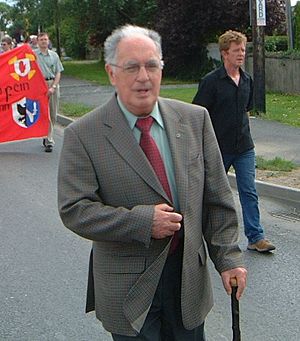
The party officially split in 1970 over the issue of taking seats in parliament. The group that continued to support abstentionism became known as "Provisional" Sinn Féin. The other group became "Official" Sinn Féin.
The "Provisionals" were committed to military action and were closely linked with the Provisional IRA. The party's main role was to provide publicity and support. During the 1981 Irish hunger strike, a striking prisoner named Bobby Sands was elected to the British Parliament. His victory showed the party that it could succeed through elections.
This led to the "Armalite and ballot box strategy," which combined political action with armed struggle. In 1983, Gerry Adams became the new president of Sinn Féin, replacing Ruairí Ó Brádaigh.
Focus on Politics and Peace (1983–1998)
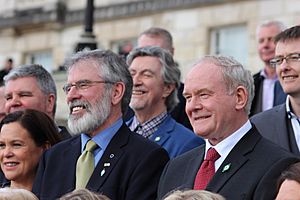
Under Gerry Adams, Sinn Féin began to focus more on winning elections. In 1983, Adams won a seat in the British Parliament for West Belfast. By 1985, the party had 59 councillors in Northern Ireland.
In 1986, the party made a historic decision to end its policy of abstentionism for the Dáil Éireann. This meant that if its members were elected to the Irish parliament, they would take their seats. Some members who disagreed with this decision left to form Republican Sinn Féin.
During the 1990s, Sinn Féin became deeply involved in talks to end the conflict in Northern Ireland. These talks, which included the British and Irish governments and other political parties, led to the Good Friday Agreement in 1998. This agreement created a new power-sharing government for Northern Ireland.
A Major Political Force (1998–2017)
After the Good Friday Agreement, Sinn Féin's popularity grew in both Northern Ireland and the Republic of Ireland. In 1997, Caoimhghín Ó Caoláin became the first Sinn Féin TD to take his seat in the Dáil in over 75 years.
In Northern Ireland, Sinn Féin became the largest nationalist party. The party shared power in the government with the Democratic Unionist Party (DUP). In 2007, Sinn Féin made another historic move by voting to support the Police Service of Northern Ireland (PSNI).
In 2017, Gerry Adams announced that he would step down as president of Sinn Féin after leading the party for 35 years.
New Leadership and Recent Success (2018–Present)
On February 10, 2018, Mary Lou McDonald became the new president of Sinn Féin. Michelle O'Neill was elected as vice president.
In the 2020 Irish general election, Sinn Féin had its best result ever in the Republic of Ireland. The party won the highest number of first-preference votes and became the second-largest party in the Dáil.
In the 2022 Northern Ireland Assembly election, Sinn Féin became the largest party in the Assembly for the first time. This was a historic moment for an Irish nationalist party. As a result, Michelle O'Neill became the First Minister of Northern Ireland in February 2024.
What Does Sinn Féin Believe In?
Sinn Féin is a left-wing party that supports Irish republicanism and democratic socialism. This means it wants to create a united Ireland and build a fairer society with strong public services.
Key Policies
- A United Ireland: The party's main goal is to unite Northern Ireland with the Republic of Ireland to create a single country.
- Economy: Sinn Féin wants to invest in public services like housing and healthcare. It supports higher taxes for large corporations and high earners to pay for these services.
- Health: The party wants to create an "All-Ireland Health Service," similar to the National Health Service in the UK, that is free for everyone.
- Housing: Sinn Féin has promised to build thousands of new social and affordable homes to solve the housing crisis.
- European Union: The party is critical of some EU policies but supports Ireland's membership. It campaigned for the UK to remain in the EU during the Brexit referendum.
Past Links with Paramilitary Groups
In the past, especially during the Troubles, Sinn Féin was associated with the Provisional Irish Republican Army (IRA), an armed group. The Irish and British governments stated that the two groups were closely linked. The party's leaders at the time denied that the IRA took orders from them.
A republican document from the 1980s said that the IRA fought an "armed campaign" while Sinn Féin fought the "propaganda war" and was the "political voice of the movement."
As part of the Northern Ireland peace process, the IRA ended its armed campaign. Sinn Féin is now fully committed to achieving its goals through peaceful and democratic politics. The party's journey from being on the political margins to becoming a major force in government is a key part of modern Irish history.
Election Results
Sinn Féin has become one of the most popular parties on the island of Ireland.
Northern Ireland Assembly
Sinn Féin first won seats in the Northern Ireland Assembly in 1998. Its support has grown steadily since then. In the 2022 Northern Ireland Assembly election, it won 27 seats and became the largest party for the first time.
UK Parliament (Westminster)
Sinn Féin contests elections for the UK Parliament but follows a policy of abstentionism. This means its elected MPs do not take their seats in the House of Commons in London. They do this because they do not recognise British rule in Northern Ireland. In the 2024 United Kingdom general election, the party won 7 of Northern Ireland's 18 seats.
Irish Parliament (Dáil Éireann)
After many years with only a few TDs (members of the Dáil), Sinn Féin's support in the Republic of Ireland has grown a lot.
- In the 2011 Irish general election, it won 14 seats.
- In the 2016 Irish general election, it won 23 seats, becoming the third-largest party.
- In the 2020 Irish general election, it won 37 seats and the most first-preference votes.
- In the 2024 Irish general election, it won 39 seats, remaining the second-largest party and the main party in opposition.
See also
 In Spanish: Sinn Féin para niños
In Spanish: Sinn Féin para niños
 | Aaron Henry |
 | T. R. M. Howard |
 | Jesse Jackson |


